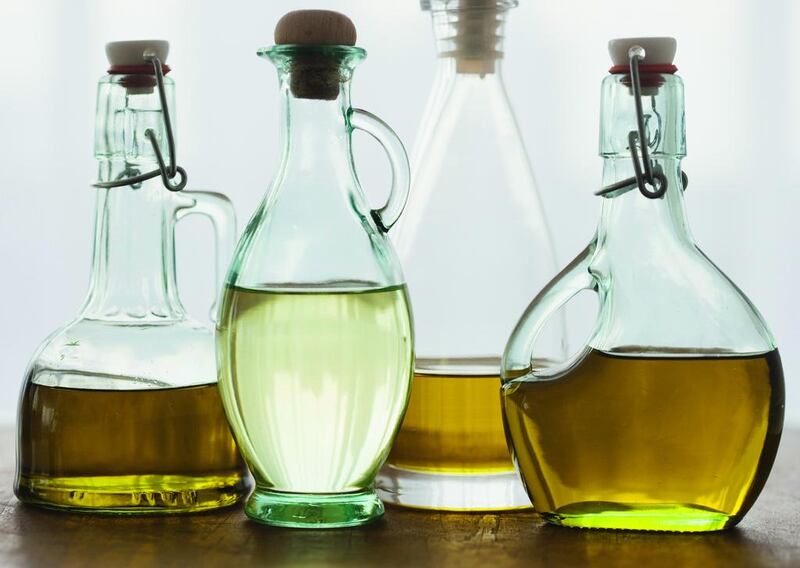Avocado or olive, sunflower or peanut; cooking oil can be a slippery customer when it comes to choosing a variety fit for purpose.
The “good versus bad” fats debate will always rage, but what differentiates cooking oils is their composition and understanding this can be a bit challenging.
The ratio of saturated, monosaturated and polyunsaturated fats that make up each type of oil determines the effect on our well-being, as well as its suitability for specific cooking techniques.
Archana Baju, clinical dietitian at Burjeel Hospital, Abu Dhabi, says it’s important to understand the pros and cons of each fat before reaching for your usual oil. “The most beneficial oils health-wise are those that contain monosaturated fat, and this includes light-coloured olive oil for cooking and canola oil for baking,” she explains.
It gets a little complicated when considering polyunsaturated fats. “There are two types – omega-3 and omega-6 fatty acids. Omega-3 is usually found in oils such as canola, and a certain amount in soybean oil and walnut oil. Omega-6 is found mostly in liquid vegetable oils such as soybean, corn and safflower,” she adds. Our bodies need both of these fatty acids, but in balance (more omega-3s, which are anti-inflammatory and essential for development, and less omega-6s, which can cause inflammation when over-consumed), and certain oils such as soybean and sunflower are loaded with omega-6s.
Baju is firmly against trans-fats, which are formed when oil is processed using hydrogenation (to make them solid at room temperature), and found in processed foods and snacks. She says trans-fats are unsafe and should be avoided at all costs. Rounding up the list is saturated fat, “which can be healthy if used in moderation”.
The next challenge is understanding which oil to choose when cooking at high temperatures. Using an “unstable” oil can lead to oxidation, in which free radicals and other potentially toxic compounds such as aldehydes are released, and which have been linked to cancer, cardiovascular disease and other diseases. “Simply put, saturated fats and monounsaturated fats are resistant to heating, but oils that are high in polyunsaturated fats should be avoided for cooking,” she says.
A research study by scientists at De Montfort University in the United Kingdom in 2015 found that cooking with sunflower and corn oil at high temperatures produced aldehydes at levels 20 times greater than those recommended by the World Health Organization, with olive and rapeseed oils producing considerably lower quantities.
Advocates of the clean eating movement recommend avoiding processed foods, including hydrogenated vegetable cooking oils, in favour of all-natural alternatives. Our grandmothers cooked with butter and goose fat, and this is undergoing something of a resurgence. “The use of traditional fats is better than processed as the latter loses a significant amount of nutrients in the process. However, traditional fats also need to be consumed in moderation,” says Baju.
Another trending oil is coconut, but it’s a love or hate thing, with detractors highlighting its high saturated-fat content of 90 per cent (versus butter at 64 per cent), which is a cholesterol red flag, while its fans reel off a list of health benefits.
“The significant percentage of saturated fat makes it great for cooking as it is resistant to heat. It also offers extreme health benefits. It can improve cholesterol and help kill bacteria and other pathogens. The fats in coconut oil are also known to boost metabolism in addition to making us feel less hungry,” says Baju.
A 2009 study of obese young women in Brazil, published in the journal Lipids, found that those who consumed two tablespoons of coconut oil per day for three months saw increases in their good (HDL) and bad (LDL) cholesterol, but that HDL levels were respectively greater. The jury is still out.
Organic, expeller-pressed and cold-pressed oils are also being proffered as a healthier alternative. Baju agrees: “Compared to other refined oils, cold-pressed oils retain the vitamins, minerals and fatty-acid bonds.”
Finding these alternatives on the average supermarket shelf isn’t easy, and with one tablespoon of cooking oil averaging around 120 calories and 13 grams of fat, she notes that moderation is key. “Where possible, use the least amount of fat possible, such as non-fat cooking sprays. If you are using the oil for cooking or for making dressings, try to use those lowest in saturated fats, trans-fats and cholesterol, such as canola, corn, olive or sunflower oil.”






